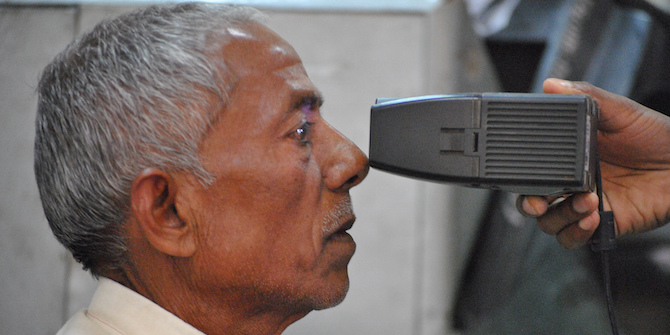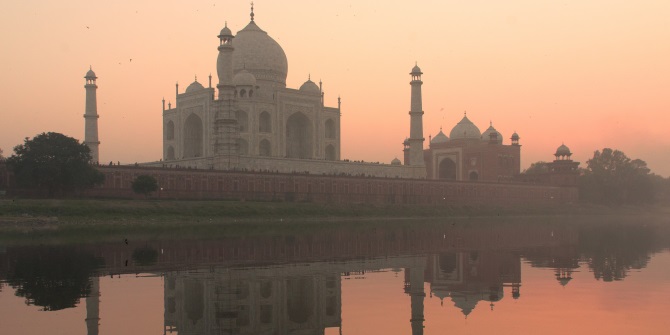
At the LSE Pakistan Summit 2017 veteran lawyer and human rights activist Hina Jilani spoke on the Constitution panel. Here she speaks to Sonali Campion about the achievements of the women’s rights movement, the weaknesses of the law in protecting women and minorities, and the need for a regional approach to human rights in South Asia.
SC: You have campaigned for women’s rights throughout your career. What progress has there been and what new challenges have arisen?
HJ: Progress is very apparent. When we started the most recent women’s rights movement in the 1980s during Zia-ul-Haq’s time there was no freedom of association, freedom of assembly or freedom of expression. It was very difficult to mobilise public opinion in favour of women’s rights, gender equality, non-discrimination, freedom from violence etc. The notion of women’s rights was totally absent, both in the social psyche as well as in the political and legislative environment in this country.
Our movement did have an effect. Immediately after the lifting of marshal law in 1988 we had an election. Firstly, Pakistan elected a woman as their prime minister. Secondly, and what is more important, is that every political party contesting that election had a women’s rights programme in their manifesto. Women’s rights have therefore become a very important political issue today in Pakistan. In the area of legislation there have been several law reform initiatives that might not have practically improved the situation, but they have certainly made it a part of state policy to favour women’s rights and to combat violence against women.
I can give you one example of a very nefarious practice, which is called honour killing in Pakistan. There was a time in the late ‘90s when a woman, a client of mine, was killed in my office by her own family in the name of ‘honour’. That was a game changer in some ways. It was the first time that this issue erupted as part of the public discourse on women’s rights. We asked one of the Senators to take a resolution against the practice of honour killings to the Senate. He tabled that resolution and was almost lynched by his fellow senators. Today the situation has drastically changed. You will not find that anyone – politician, academic, journalist – who will publicly justify or defend honour killings.
We may not in reality have been able to eradicate all these practices which are harmful to women, but at the same time we have made the society conscious and defensive. The message has very clearly gone out that this is not something that is acceptable anymore.
Is the law itself discriminatory towards women? If so, is that to do with Sharia, or to do with the hangovers of colonial law?
Colonial law discriminates because of its neutrality. It doesn’t take into account the specificities which have to be put in place if women are to get a good deal under the law. But with the Sharia laws, the Islamic penal laws which were introduced in the 1980s, there is very visible and deliberate discrimination. Fortunately some of the damage has been mitigated by subsequent legislation, and certain reforms have marginalised those laws against which we waged a struggle for almost 25 years. Even though those laws still remain on the statute books the effects and the consequences are much more watered down than they used to be.
Are the challenges that minorities face due to a lack of legal protection? How do you deal with laws like the blasphemy law?
Let me first of all clarify that the blasphemy law doesn’t target minorities – or non-Muslims in Pakistan – alone. If you look at the data you will understand that this has harmed Muslims more than anybody else. The intention of that law during Zia-ul-Haq’s time (when it was created) was to target other sectarian groups in this country. This is a Sunni majority country, but the Sunnis have several divisions within themselves so one division is being played against the other, and Shias are being targeted all the time. It has been used very widely to harm the Ahmadiyya community in this country. So it is a law that has been used very widely to decimate other sects within Islam.
The second target has been non-Muslims minorities, and that is less intentional. The minorities suffer because of the abuse of this law by people with other motivations. For instance several Christian communities have been forcibly evicted from their place of residence by using this blasphemy law and making it dangerous for them to live in that locality. The motivation was to grab land.
There are also those elements in our society that are trying to gain political significance by using Islam and trying to force conversions on non-Muslim populations. The majority of the targets are Hindu Scheduled Castes in Sindh, where groups try to get political acclaim through these forced conversions. These kinds of problems are arising. Furthermore, the use of the blasphemy law plus the over-emphasis of the Muslim religion by the state has created a sense of vulnerability, which is used by certain elements in the society to make minorities more and more insecure in Pakistan.
Senator Sherry Rehman talked about how the regional divisions seem to be deepening and we’re not thinking as ‘South Asia’. You’re part of South Asians for Human Rights, could you tell me to what extent this regional approach is needed, and how challenging is it to foster this collaborative approach?
It’s very important. You can see that in almost all parts of the world that regional security and economic cooperation has been indispensable for coexistence. This particular region is the only one that has not thought about it, and has in fact resisted it. It is largely because of the India-Pakistan animosity that the other countries have also not been able to benefit from any kind of effective regional cooperation.
However, we believe that there are common issues of concern to populations on different sides of the borders in this region. There are cross-border issues that cannot be addressed by one particular country. Therefore it is very important that there should be a civil society mobilisation and movement for the protection of the rights of people across region.
Secondly, the states must understand that peace is indispensable to effectively safeguarding the rights and entitlements of their people. Peace cannot be forged unless there are forums of dialogue and discussion. Common values have to be put in place and recorded as binding on states in terms of their relationships with each other with respect to how their populations are going to be affected, whether it is water, whether it is economic and social resources and progress or it is civil and political rights. In all these aspects a regional cooperation is absolutely necessary. We are the only part of the world that does not have, for instance, a regional human rights mechanism that enforces the rights of people on one side of a border over the actions of a government on the other side.
These are some of the things I think which are very important, and we are fighting for them. It is not a losing battle but it is certainly a challenging one because of the way that these states see themselves. The people are closer than the states can ever be. Civil society meets, we have good networks, but what can we do? How far can we be effective if visa difficulties mean we can hardly meet each other physically? The only two places we can hold conventions at the regional level are Kathmandu or Sri Lanka. Even then the communications are prohibitive – getting to Kathmandu takes me 12 hours, because I cannot take a direct flight. I cannot take a direct flight to Bangladesh. That makes for a very bad environment for fostering regional initiatives that will alleviate the common problems that we have.
Cover image: ‘2017 WPC Awards’ event acknowledging women ‘change-makers’ from Khyber Pakhtunkhwa on International Women’s Day 2017. Credit: UN Women CC BY-NC-ND 2.0
Watch the Pakistan @ 70 Constitution panel in full here. You can also see a short video with Hina Jilani talking about the contradictions of the provisions in the Constitution of Pakistan here.
This article gives the views of the interviewee, and not the position of the South Asia @ LSE blog, nor of the London School of Economics. Please read our comments policy before posting.
About the Authors
 Hina Jilani is a human rights activist and advocate at the Supreme Court of Pakistan. Jilani co-founded the first all-female legal aid practice in Pakistan, AGHS Legal Aid Cell, is one of the founders for the Human Rights Commission of Pakistan, and the Women’s Action Forum. Jilani also runs Dastak, a shelter for women fleeing violence and abuse. She has served at the UN Fact Finding Mission on the Gaza Conflict and is a member of the Eminent Jurists Panel on Terrorism, Counter-Terrorism and Human Rights. Jilani was awarded the Ginetta Sagan Award by Amnesty International in 2000.
Hina Jilani is a human rights activist and advocate at the Supreme Court of Pakistan. Jilani co-founded the first all-female legal aid practice in Pakistan, AGHS Legal Aid Cell, is one of the founders for the Human Rights Commission of Pakistan, and the Women’s Action Forum. Jilani also runs Dastak, a shelter for women fleeing violence and abuse. She has served at the UN Fact Finding Mission on the Gaza Conflict and is a member of the Eminent Jurists Panel on Terrorism, Counter-Terrorism and Human Rights. Jilani was awarded the Ginetta Sagan Award by Amnesty International in 2000.
 Sonali Campion is Communications and Events Officer at the South Asia Centre. She holds a BA (Hons) in History from the University of Oxford and an MSc in Comparative Politics from LSE. She tweets @sonalijcampion.
Sonali Campion is Communications and Events Officer at the South Asia Centre. She holds a BA (Hons) in History from the University of Oxford and an MSc in Comparative Politics from LSE. She tweets @sonalijcampion.







Law are there to protect women but law in action is indispensable.